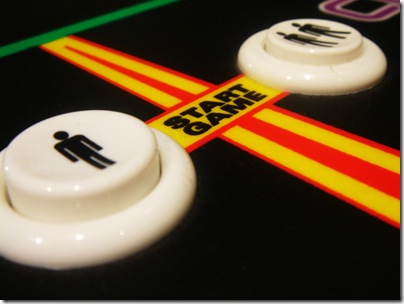
The Pew Internet & American Life Project recently released a very significant survey which really challenges many popular preconceptions and myths about videogames and the impact of game play on young people. One of the most important findings is that any stereotype of the typical video game player seems pretty much useless, because almost all American teens, in all their diversity, play videogames:
- Fully 97% of teens ages 12-17 play computer, web, portable, or console games.
- 50% of teens played games “yesterday.”
- 86% of teens play on a console like the Xbox, PlayStation, or Wii.
- 73% play games on a desktop or a laptop computer.
- 60% use a portable gaming device like a Sony PlayStation Portable, a Nintendo DS, or a Game Boy.
- 48% use a cell phone or handheld organizer to play games.
- 99% of boys and 94% of girls play video games.
Nor is there one dominant gaming type or genre:
The five most popular games among American teens are Guitar Hero, Halo 3, Madden NFL, Solitaire, and Dance Dance Revolution. These games include rhythm games (Guitar Hero and Dance Dance Revolution), puzzle/card games (Solitaire), and sports games.
Likewise, rather than being isolating, gaming is actually a primarily social experience for many teens:
For most teens, gaming is a social activity and a major component of their overall social experience. Teens play games in a variety of ways, including with others in person, with others online, and by themselves. Although most teens play games by themselves at least occasionally, just one-quarter (24%) of teens only play games alone, and the remaining three-quarters of teens play games with others at least some of the time.
- 65% of game-playing teens play with other people who are in the room with them.
- 27% play games with people who they connect with through the internet.
- 82% play games alone, although 71% of this group also plays with others.
It was also reassuring that most parents monitor what sort of games their kids play, at least in the earlier years, and most parents did not find any correlation between videogames and anti-social or violent behaviour in teens:
- 90% of parents say they always or sometimes know what games their children play.
- 72% say they always or sometimes check the ratings before their children are allowed to play a game.
- 46% of parents say they always or sometimes stop their kids from playing a game.
- 31% of parents say they always or sometimes play games with their children.
- 62% of parents of gamers say video games have no effect on their child one way or the other.
- 19% of parents of gamers say video games have a positive influence on their child.
- 13% of parents of gamers say video games have a negative influence on their child.
- 5% of parents of gamers say gaming has some negative influence/some positive influence, but it depends on the game.
One of the other major findings was that games tended to be played socially (ie with others) more than in isolation, and that gaming communities tended to make teens socially and politically active! If you’re in any way interested, I’d encourage you to look at the report yourself (PDF link); it’s already getting decent media coverage. Meanwhile, the BBC also reports that a huge study of EverQuest II players discovered that they were neither obese nor was their Body Mass Index (BMI) any higher than the norm (actually, it was a little lower).
[Photo: ‘I … Will Help … My Friends’ by _mpd_, CC BY NC SA.]

